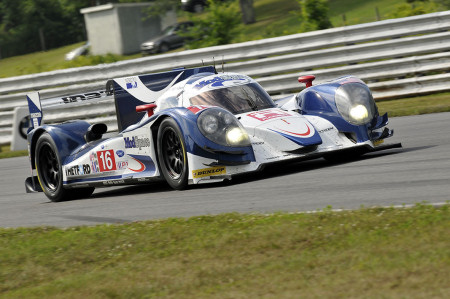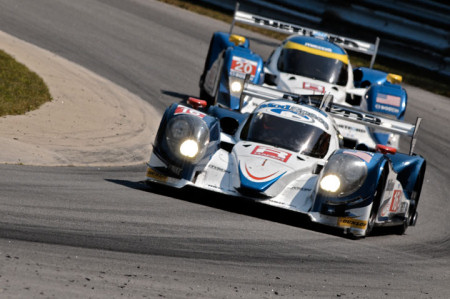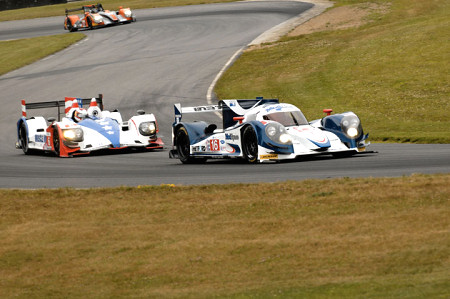The Way It Is / ALMS champions and true believersby Gordon Kirby |
 It's an uphill push for Dyson Racing to defend its ALMS title this year. First of all there's serious competition from Greg Pickett's well-developed Muscle Milk HPD ARX-03a, winner of the last three ALMS races with Klaus Graf/Lucas Luhr. But the key factor is that Rob and Chris Dyson's operation has been playing catch-up after the late delivery of this year's latest Lola B12/66 just prior to Lola declaring bankruptcy.
It's an uphill push for Dyson Racing to defend its ALMS title this year. First of all there's serious competition from Greg Pickett's well-developed Muscle Milk HPD ARX-03a, winner of the last three ALMS races with Klaus Graf/Lucas Luhr. But the key factor is that Rob and Chris Dyson's operation has been playing catch-up after the late delivery of this year's latest Lola B12/66 just prior to Lola declaring bankruptcy.
Dyson Racing is the ALMS's most experienced and successful team with 67 wins, including two Daytona 24 Hours victories and nineteen sports car championships to its credit over 29 years. Rob Dyson started racing in 1974 and founded his IMSA GTP team in 1983. Rob retired from driving a few years ago and shares responsibility for running his team with son Chris who leads the team from the cockpit and the sporting director's office. The Dysons' team raced a variety of AER-engined Lolas from 2002-'06 and ran a pair of Porsche RS Spyders in 2007 and '08. Dyson resumed his partnership with Lola in '09 and struck a new partnership with Mazda to develop the company's 2-liter turbocharged ALMS engine. Last year Dyson's pair of Lola-Mazda LMP1 cars were the ones to beat and Chris Dyson and Guy Smith won the ALMS championship with a perfect finishing record, taking first or second in every race. But the late delivery of this year's new cars and Lola's financial problems threw a wrench into the works this year. "All I can say is it's been a headache and very unfortunate for our management," Chris remarks. "We took delivery of the car literally ten days before the green flag for the Sebring 12 Hours. We were planning on a lot more time to test but we were let down more than a little bit by the late delivery. We really had to scramble for Sebring. We were fortunate to get out there and run. While we weren't competitive the car was reliable and we were able to score a fortunate (ALMS class) win and get off to a good start.  © Gary Gold After Long Beach and Laguna Seca the team took advantage of the Le Mans 24 Hours break in the ALMS schedule. A lot of work went into Dyson's pair of Lola-Mazdas prior to Lime Rock and the second half of the ALMS season and like last year the team will run two cars in most remaining races. "We immediately knuckled-down and tried to take advantage of the seven week period we had off," Chris said. "We've done some testing and some tire development and we've hit the ground running for the second half of the season. We hope that we can score consistently as the car is getting better and eventually be in a position where we're challenging for wins." Guy Smith was able to qualify Dyson's lead car on the pole at Lime Rock although they were beaten again in the race by Greg Pickett's Muscle Milk HPD. "Because of the way the points are structured in the ALMS you have to win and you have to finish," Chris observed. "A win won't make or break your season but a DNF will kill you. From the outset the reliability has been our strong point with the car. We're just trying to find the speed so we can be up front. "We've got the nice variety in this series of different tires, chassis and engines, and that sometimes means there are some wild cards out there. To the extent that we can control what we can control I feel a lot better sitting here today than I did two months ago before going to Monterey. With everything that's happened with our chassis supplier, it's been challenging." Greg Pickett's team finished second to Dyson in last year's ALMS championship with Graf and Luhr driving a Lola-Aston Martin. This year Pickett has switched to an HPD ARX-03a based on the successful Acura LMP2 car with continued development from HPD in California and Nick Wirth in the UK. "The HPD is a very strong benchmark," Chris said. "Greg Pickett's team have done a superb job with the car and it's a solid, well-developed platform."  © Gary Gold "We are fully intending to run this car, fully-prepared with spares for as long as we want to run it," Rob declared. "We're making sure that we can do that. It's terribly unfortunate what happened and the way it was handled on Lola's side. But we've got to do what we've got to do and deal with it and that's what we're doing. "As far as the future and what chassis development we can do I think we can either evolve this car or build another one. We're not going to stop sports car racing just because Lola has disappeared and frankly I don't think anyone else is either. I think the plan would be that when it comes time for us to do something we'll deal with it. But we anticipate being able to maintain this chassis as it evolves and if we have to draw something new we'll do what we have to do. "Fortunately, we have a good reputation that we've maintained scrupulously. Our suppliers know that when we want to do something we're serious about i.t So we've had very good acceptance with people having to deal with the issues as they are. Going forward in the future we'll be able to do the same thing. If we come up with some whizz-bang idea we'll incorporate it into the car. We're going to respond as the competition develops." Chris Dyson says the open spirit of ALMS's technical rules has allowed the team to attract some first-class engineers. "We've really upgraded our technical team in the last few years," Chis said. "It's been a function of the fact that this series rewards technical innovation and being ahead of the curve. You have an intimate relationship with your tire company here, as we do with Dunlop, that you don't see in other series where there's a spec tire. I think there's a much more important role for engineers to play in this form of racing than anything bar Formula One. "As a result we've been able to attract some really strong technical talent to the team. We've got a lot of people who very much believe in Dyson Racing and what we're doing with the package. The fact that Lola is no longer in existence is unfortunate, but it does present some opportunities for us." With Mazda announcing a new LMP2 engine for 2013 the Dysons expect to move on to a different power plant next year. The team has a long relationship with AER of course and Rob and Chris say they are looking at all possibilities. "Mazda have taken their engine development to another firm and we're looking at our options for the future after this year," Chris said. Rob is proud that his team has raced in recent years on Isobutanol fuel. "That was a collaborative effort between Mazda, BP and us," he commented. "It's worked out very well. The fuel is not only viable but it's available and it's part of where we've got to be. We've got to start growing our fuel in every respect and the oil companies know it." Rob is renowned as one of the biggest fans of the ALMS's technical philosophy.  © Gary Gold "My guys are all hot-rodders and to a great extent that's what we're doing. We're hot-rodders. If something comes along that looks like it'll work, we're going to try it. Nowadays it's not a Hedman Header or Hurst Shifter or Edelbrock manifold. It's much more than that. It's much more sophisticated but it's nevertheless a variation on the same theme that if the rules allow it then you can try it and if it works we'll run it. And if it doesn't work, we'll modify it so it does. That's what makes this form of racing so much fun." Chris Dyson expanded on his father's enthusiasm for high-performance sports car racing. "I think a lot of people want to dismiss what the fans want to see," Chris remarked. "And what the fans really want to see is exciting, explosive, edgy cars that are pushing the limits not only for the drivers on the track but are also pushing the limits of technology. "I think it's really easy to say we want to control costs and make it accessible. Time and time again you've seen numerous attempts to dumb things down and make racing more and more like a template. That's fine as long as you're oversubscribed, but if you're in a situation where you're looking to attract fans in my opinion you have to give them something along the lines of what IMSA Camel GTP was when the cars were just mind-blowing. Everything else flows from that. "This is why we applaud the ALMS so much because there's a blend here of what the FIA's agenda is and what serves the American public and promoters. I think they've got it right. The more IMSA and the ALMS have done over the years to be autonomous has always been rewarded. It's always been better for the fans, better for the promoters and better for us. We're very grateful of the efforts Scot Elkins and previously Doug Robinson and Tim Mayer have done to insure that the field looks great and the cars are exciting." Meanwhile Guy Smith is looking forward to Mosport next weekend and the rest of the ALMS season. Winner of the Le Mans 24 Hours with Bentley in 2003 he's one of the world's best sports car racers. "I expected to be half a second off the pace here compared to the Acura," Smith told me at Lime Rock. "So it was encouraging to qualify as well as we did. But they're a very strong team and in the race both those guys are very tough to beat. We're still learning how to get the best from the tires and we're also learning about the car and the engine, the whole package really. "I don't really know our strengths yet whether the car is good on high speed or low speed corners. We're still on a learning curve. A lot of it is in the tires. Once we get them working we'll be in good shape. I think we should be good at Mosport, Road America and Atlanta. Places like Baltimore where it's low grip and all slow corners might be tough for us. I'm looking forward to Mosport. It's a great track, a bit tough to pass. They don't make them like that any more, do they?" Without any prospects of major factory-backed LMP1 or P2 teams the ALMS is lucky to have deeply experienced, independent racers like the Dysons and Greg Pickett committed to keeping the flame of prototype sports car racing burning in America. |
Auto Racing ~ Gordon Kirby Copyright 2012 ~ All Rights Reserved |
